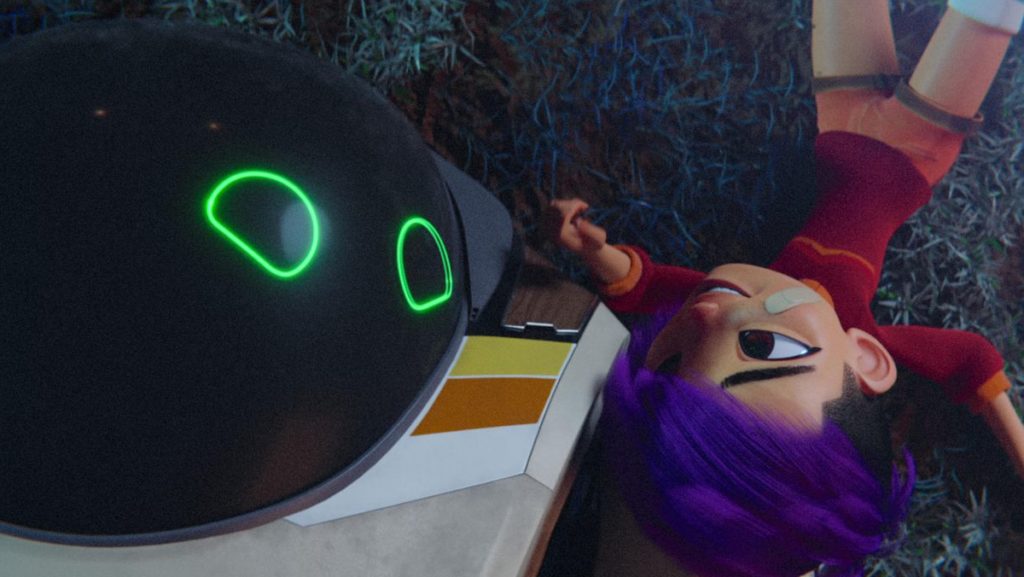“Next Gen,” an animated Netflix sci-fi film, has attributes that could instantly make the movie a smash hit. The piece has decent animation, which is reminiscent of the smooth, stylistic 3D animation of Disney and Pixar. It also has a solid cast of voice actors, including Charlyne Yi as Mai, who is known for lending her voice to the character Ruby from “Steven Universe.” But everything just seems to fall flat, stopping the film frustratingly short of its true potential.
The unnerving resemblance to Disney film “Big Hero 6” may be to blame for the movie’s failure to deliver. Both films have the same bubbly, cheerful, sci-fi setting, and that isn’t where the similarities end.
It is not necessarily bad for directors to take notes from other movies in the same genre as their own, but in this case, the resemblance goes beyond what should be considered decent. Specifically, the design of the city in which “Next Gen” takes place is alarmingly similar to San Fransokyo from “Big Hero 6.” With the sleek, technologically advanced architecture designed to have a mixture of Western and Japanese influence, the setting of “Next Gen” is almost entirely a cheap knock-off of the gloriously beautiful city that Disney conceived back in 2014. Aside from the city, even the character designs feel eerily similar. The stylized proportions of the characters’ bodies and the designs of their faces nearly mirror “Big Hero 6.” However, the uncanniness of the resemblance would be forgivable if the movie also had a consistently strong cast and well-rounded storyline. “Next Gen” doesn’t promise either.
Yi delivers a stellar performance, as does Jason Sudeikis as Justin Pin and John Krasinski as Robot, 7723, but the execution of David Cross as Dr. Tanner Rice and Constance Wu as Molly are both lackluster. Cross and Wu both appear to struggle with line delivery, offering a wooden performance with very little energy or emotion.
Both Cross and Wu are used to blowing audiences away with their impressive handle on character delivery. Cross was wildly enjoyable in “Megamind” as Minion, and Wu brought down the house during her recent appearance in “Crazy Rich Asians” as Rachel Chu. The strong history that Cross and Wu have in Hollywood makes their weaknesses in “Next Gen” especially surprising.
The cast’s failure to deliver doesn’t necessarily lie in the resemblance to “Big Hero 6,” but rather in the weak script they were provided.
“Next Gen” contains a few heartwarming moments throughout its run, utilizing complex character dynamics. The movie follows a heartbreaking story about Mai, a broken, fatherless little girl who is brutally bullied at school. Molly, Mai’s mother, falls back onto robots to cope with the loss of her husband, neglecting her daughter in the process. The framework is there for a fairly decent and impactful storyline, but the script is peppered with awkward interactions and badly executed comic relief. Two particularly cringeworthy “comedic” moments include a talking dog with a dirty mouth and a scene in which Mai gets into a fist fight with her robotic toothbrush. These moments, which are supposed to lighten the mood and add to the enjoyment of the viewers, feel strangely placed and ultimately weaken the movie even further.
The dialogue between characters also tends to be inorganic, leaving interactions feeling rushed and forced. Because of the badly written conversations, characters often feel disconnected from one another and the viewers, making it hard to fully enjoy the viewing experience.
The most enjoyable part of the movie is, hands down, the villain, Justin Pin. Pin is a well-respected public figure known for producing the best robots on the market. The character is clearly based off of familiar people-pleasing tech giants such as Bill Gates. Pin goes from patronizing to manipulative to downright terrifying and is one of the most rounded individuals in the movie. Pin is shrouded in mystery for the main part of the film with a seemingly unmotivated desire to kill people until a massive twist at the end brings light to Pin’s brutal and unyielding knack for villainy.
Although Pin is such a wonderful, loathsome, bad guy, he was not spared terrible comedic timing. In the end, Pin is defeated when he’s bitten and distracted by the talking dog, becoming another victim of poor comic relief. The unsatisfactory conclusion to Pin’s reign of terror feels like a huge oversight, leaving the ending of the movie feeling unfinished and annoyingly unfulfilling. After Pin dies of sheer convenience, the credits roll on an overly cheerful, equally unsatisfying final scene, dooming “Next Gen” to the sad fate of mediocrity.




















